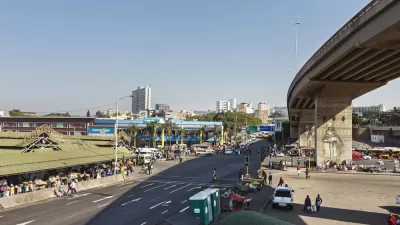CNN reports on the growing chaos in suburbs emptied by the mortgage crisis, and what they tell us about the future of the American dream.
"While the foreclosure epidemic has left communities across the United States overrun with unoccupied houses and overgrown grass, underneath the chaos another trend is quietly emerging that, over the next several decades, could change the face of suburban American life as we know it.
This trend, according to Christopher Leinberger, an urban planning professor at the University of Michigan and visiting fellow at the Brookings Institution, stems not only from changing demographics but also from a major shift in the way an increasing number of Americans -- especially younger generations -- want to live and work.
"The American dream is absolutely changing," he told CNN.
This change can be witnessed in places like Atlanta, Georgia, Detroit, Michigan, and Dallas, Texas, said Leinberger, where once rundown downtowns are being revitalized by well-educated, young professionals who have no desire to live in a detached single family home typical of a suburbia where life is often centered around long commutes and cars.
Instead, they are looking for what Leinberger calls "walkable urbanism" -- both small communities and big cities characterized by efficient mass transit systems and high density developments enabling residents to walk virtually everywhere for everything -- from home to work to restaurants to movie theaters."
FULL STORY: Is America's suburban dream collapsing into a nightmare?

Planetizen Federal Action Tracker
A weekly monitor of how Trump’s orders and actions are impacting planners and planning in America.

Maui's Vacation Rental Debate Turns Ugly
Verbal attacks, misinformation campaigns and fistfights plague a high-stakes debate to convert thousands of vacation rentals into long-term housing.

Restaurant Patios Were a Pandemic Win — Why Were They so Hard to Keep?
Social distancing requirements and changes in travel patterns prompted cities to pilot new uses for street and sidewalk space. Then it got complicated.

In California Battle of Housing vs. Environment, Housing Just Won
A new state law significantly limits the power of CEQA, an environmental review law that served as a powerful tool for blocking new development.

Boulder Eliminates Parking Minimums Citywide
Officials estimate the cost of building a single underground parking space at up to $100,000.

Orange County, Florida Adopts Largest US “Sprawl Repair” Code
The ‘Orange Code’ seeks to rectify decades of sprawl-inducing, car-oriented development.
Urban Design for Planners 1: Software Tools
This six-course series explores essential urban design concepts using open source software and equips planners with the tools they need to participate fully in the urban design process.
Planning for Universal Design
Learn the tools for implementing Universal Design in planning regulations.
Heyer Gruel & Associates PA
JM Goldson LLC
Custer County Colorado
City of Camden Redevelopment Agency
City of Astoria
Transportation Research & Education Center (TREC) at Portland State University
Jefferson Parish Government
Camden Redevelopment Agency
City of Claremont



























